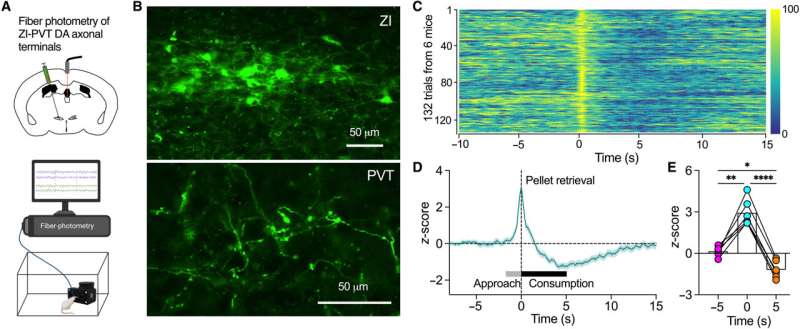This article has been reviewed according to Science X's editorial process and policies. Editors have highlighted the following attributes while ensuring the content's credibility:
fact-checked
peer-reviewed publication
trusted source
proofread
Neuroscientist finds cluster of dopamine neurons drives eating behaviors

A study by Florida State University researchers has revealed new insights into the role our brains play in why we vigorously seek food when we are hungry, knowledge that may enhance understanding of obesity and eating disorders and improve treatments for more than 3.5 billion people worldwide living with these conditions.
Led by Assistant Professor of Psychology and Neuroscience Xiaobing Zhang, the research team found specific neural circuits in the brain that control both hunger-driven, or homeostatic, and non-hunger-motivated, or hedonic, food-seeking behaviors.
The study's findings suggest behavioral therapies may be an effective long-term solution for obesity and disordered eating, particularly binge-eating disorder.
"Behavioral therapy is some of the best treatment to combat eating disorders and obesity because it targets the behavior's roots and does not cause drug-induced side effects," said Zhang, whose research program focuses on defining the connectivity and function of neural circuits that regulate food consumption and food-motivated behaviors.
The research was published Nov. 17 in the journal Science Advances.
Human behaviors, including the desire to eat, are the result of complex processes in our brains, and scientists are still learning about the mechanisms that control these functions. Zhang's research team has found the zona incerta, a region deep in the brain's core that is not well understood, plays a critical role in controlling eating behaviors.
"Normally, food-seeking and eating behaviors are orchestrated by metabolic signals related to the body's energy state," Zhang said. "However, the brain's feeding centers, such as the zona incerta, may sometimes be activated by food-associated cues or conditioned environmental stimuli instead of relying only on energy needs to drive action."
Working in mouse models, Zhang, along with doctoral student Qiying Ye and research assistant Jeremiah Nunez, isolated a tiny group of dopamine neurons within the zona incerta that activate quickly to drive food-seeking behavior when the body's energy levels dip and deactivate while food is consumed. Dopamine, known as the "feel-good" neurotransmitter, acts in the brain's reward system, and current research suggests a group of specific dopamine neurons drives homeostatic food seeking.
The Zhang team intentionally silenced these dopamine neurons, which caused the study subjects to not seek food, even when hungry. However, subjects with silenced dopamine neurons still consumed a substantial amount of food when it was freely available.
The findings help researchers understand biologically complex phenomena at the root of eating-related topics such as obesity and eating disorders. The Zhang Lab's advances shed light on the neural mechanisms that lead to these conditions to enable psychologists and physicians to take different approaches and deliver more effective therapies and treatments to patients.
While conducting this study, Zhang also discovered that zona incerta dopamine neurons help develop contextual memories related to food seeking. Going forward, Zhang hopes to study what specific effects contextual memory has on eating regulation and behavior.
"This is the first time the lab's research has been published in a journal we consider high-impact, and I feel inspired by the work we have done in my lab," Zhang said. "This publication is important for guiding the future direction of my research and my ability to add talented young scientists to the team."
More information: Qiying Ye et al, Zona incerta dopamine neurons encode motivational vigor in food seeking, Science Advances (2023). DOI: 10.1126/sciadv.adi5326





















